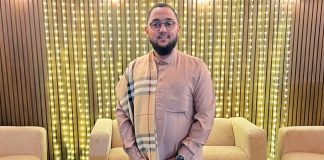When Dewsbury-born Mohammad Hussain Patel was a boy, few expected him to achieve much. Partially deaf, asthmatic, struggling with stuttering and poor eyesight, he was labelled a “weak child.” In school, he failed exams, lagged behind in reading and writing, and was constantly bullied. His parents, like many South Asian parents of that generation, worried their son would never be able to stand on his own feet.
Yet today, Hussain carries a title that commands immense respect in the Muslim community: Hafiz, someone who has memorised the entire Quran by heart. Alongside that, he is a graduate with a degree in computing from Leeds Beckett University, a qualified mechanic, and a man determined to use his story to challenge how South Asian families view disability.
“I always knew I would do something great,” Hussain said. “People said I was weak, that I would never achieve anything. But I wanted to prove them wrong. Disability or not, no child should ever be downgraded.”
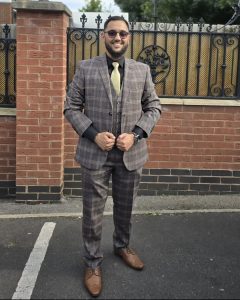
Growing up with struggles
Hussain’s early years were marked by health challenges. As a child, he was partially deaf, had asthma, and wore an eye patch to correct his vision. He also stuttered badly. “Even though English was my first language, I couldn’t pronounce words properly,” he said. “I wasn’t the brightest kid in school.”
His difficulties became more pronounced in high school. Reading was a struggle, his spelling lagged, and he never felt properly supported in class. “I was in SEN (special educational needs) but the right support wasn’t there,” he recalled. “Teachers didn’t pick up on dyslexia until much later. By then, I had already been written off.”
At home, Hussain didn’t find much encouragement either. “Asian parents don’t always understand things like dyslexia or autism. They see a child struggling and think it means failure, that the child is weak. But what kids need is extra help, not less belief.”
Facing bullying
School became a battlefield. Hussain was mocked for his stutter, his height, his slim build. “I was always the kid left alone in the playground,” he said. “Bullied in class, picked on by family relatives, even told to my face that I wouldn’t amount to anything.”
The bullying took a toll, but Hussain leaned on prayer for strength. “I always asked Allah for justice,” he said. “And I believe I got it. The people who put me down ended up regretting it.”
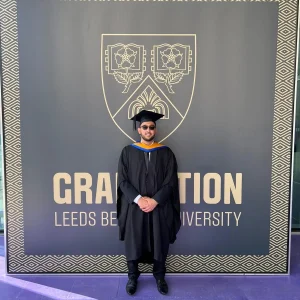
A turning point in college
It wasn’t until college that things began to change. Enrolling at Kirklees College, Hussain’s tutors recognised the signs of dyslexia and arranged proper testing. For the first time, he received tailored support: extra time in exams, note-taking assistance, and one-to-one help.
The effect was transformative. Hussain excelled in IT, passing his diploma with distinction. He went on to complete a degree in computing, despite still hating exams. “I loved computers, opening them up and figuring them out. That passion carried me through,” he said.
By the time he graduated in 2020, Hussain had done what once seemed unthinkable: he became the first in his family to get a university degree.
The Hafiz journey
Alongside his studies, Hussain quietly pursued another ambition, memorising the entire Quran. Inspired by his brother, he started his Hifz course in 2011 at Madani Mosque in Dewsbury. Progress was slow. “Because of dyslexia, I couldn’t read the Quran inside the book,” he explained. “I relied on listening to recordings, repeating them ten times, then reciting them out loud.”
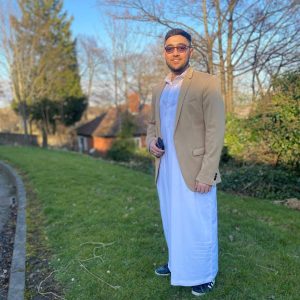
His teacher, Imam Hafiz Daud Ahmad, became a pillar of support. “There were people who doubted me, who said I’d never finish. But my ustad defended me. He said, ‘He’s doing full-time education and still not giving up. Don’t downgrade him.’ That gave me strength.”
The road was far from smooth. Hussain’s progress was interrupted by university work, jobs, and personal setbacks including the breakdown of a marriage that left him in depression. At one point, he stopped memorising altogether. “But I always came back,” he said.
To fit everything in, Hussain learned to balance work, studies, and faith with strict discipline. He often woke before dawn, memorising verses after the Fajr Namaz, before heading to college or driving taxis to support himself. “Sometimes I’d only manage a few lines a day, sometimes half a page,” he recalled. “But I kept at it. My ustad gave up his own free time after prayers to test me, and without him I wouldn’t have finished.”
Finally, in July this year, after 14 years of effort, Hussain completed his Hifz. “When I finished the last page, I cried,” he admitted. “It felt like a heavy stone lifted from my heart. Allah blessed me with this, and it made all the struggle worth it.”
Proving people wrong
For Hussain, the achievement is not just about personal pride. It is about changing perceptions. “Too many Asian parents think a child with dyslexia or autism is finished, that they’ll never do anything,” he said. “But disability is not the end. It just means the child needs more support.”
His advice to young people facing struggles is simple: “Never give up. You might fail once, twice, even three times, but the fourth time you’ll succeed. Age doesn’t matter, setbacks don’t matter. Keep going.”
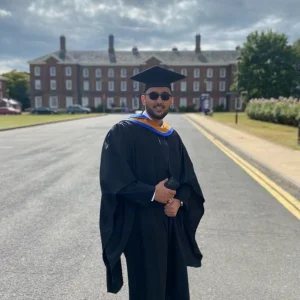
Looking forward
Hussain now hopes to build a career in cyber security while continuing to guide and motivate others. “If my story inspires even one person not to give up, that’s reward enough for me,” he said.
A Dastar-Bandi ceremony will soon formally recognise his achievement as Hafiz, watched proudly by his parents and relatives. For the boy once told he’d never amount to anything, it’s a moment of vindication.
“My journey shows that faith, patience and persistence can change everything,” Hussain said. “And it shows that no child should ever be written off.”
Of course. Here’s a glossary you can attach at the end of the article to make sure all readers including those unfamiliar with Islamic or South Asian terms can fully engage with Hussain’s story.
Glossary
Hafiz – An honorary title given to someone who has memorised the entire Quran by heart in Arabic.
Hifz – The process or course of memorising the Quran.
Quran – The holy book of Islam, containing 114 chapters (Suras).
Sura – A chapter of the Quran.
Dastar-Bandi – A traditional ceremony where a turban is tied on the head of a new Hafiz to honour their achievement.
Ustad / Mawlana / Imam – Terms used in South Asian Muslim communities to refer to religious teachers or scholars.
Fajr – The dawn prayer, one of the five daily prayers in Islam.
Namaz – The Urdu word commonly used in South Asia for the five daily Islamic prayers.
SEN (Special Educational Needs) – A UK education term referring to additional support for pupils with learning difficulties or disabilities.
Dyslexia – A learning difficulty that primarily affects skills involved in reading, spelling, and writing.



